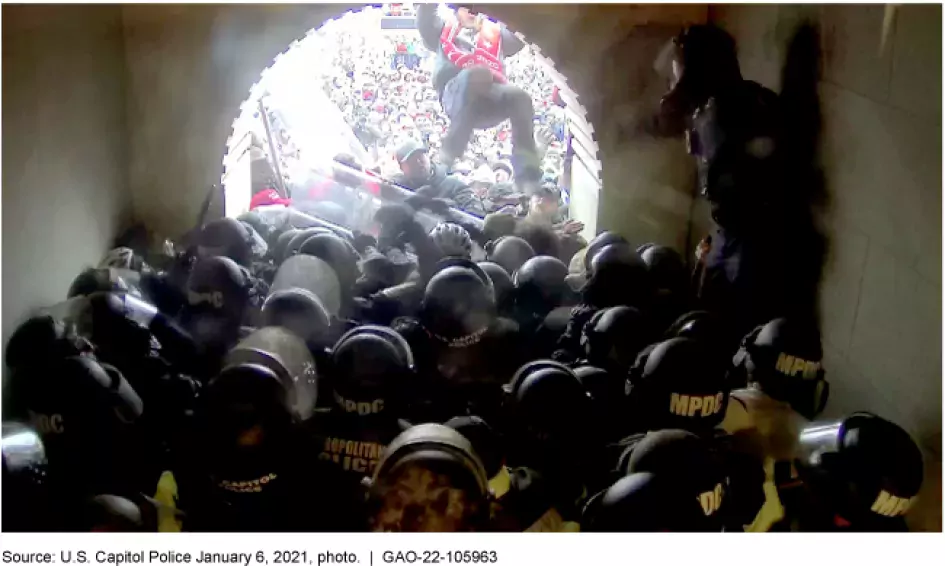Issue Summary
Incidents of domestic terrorism increased by 357% between 2013 and 2021 in the United States. Domestic terrorism is generally defined in statute as involving criminal acts dangerous to human life occurring in the U.S. that appear intended to coerce a civilian population; influence a policy of a government; or affect the conduct of government.
The Federal Bureau of Investigation (FBI) and the Department of Homeland Security (DHS) are the main federal agencies responsible for preventing terrorist attacks and countering domestic terrorism in the United States. However, they are assisted by many other government agencies and non-governmental partners who have unique roles and responsibilities in sharing terrorism-related information.
There are a number of ways these agencies could improve how they prevent and counter threats of terrorism.
For instance:
- Open-source information sharing. Several federal agencies use open-source data—such as social media posts and other publicly available information—to collect information about potential threats. For example, a review of 10 agencies that had responsibilities relevant to preparing for, or sharing information related to, the events at the U.S. Capitol on January 6, 2021, found that 7 agencies had identified potential threats based partly on open-source data. However, some of these agencies didn't share this critical information with the agencies responsible for security at the Capitol.
U.S. Capitol Police Photo of January 6, 2021, Attack
Image

- FBI and DHS collaboration. The FBI and DHS are required by statute to issue joint annual reports on domestic terrorism through 2025, which should include the domestic terrorist incident data that they have collected. However, each agency collects incident data in different ways and from different sources, and DHS data were not included in these initial annual reports. Additionally, these agencies haven’t fully assessed how effective their Joint Terrorism Task Forces and other formal agreements are in preventing domestic terrorism.
- Hate crime data. While there is no federal statute specifically criminalizing domestic terrorism, individuals who plan or carry out terrorist attacks may be prosecuted under a wide range of criminal statutes, including hate crimes. Substantial numbers of internet users have experienced online hate in recent years, and research has shown associations between online hate and hate crimes. For example, a peer-reviewed study linked uncivil internet comments with hate crimes against Asians in some U.S. cities during the pandemic. The FBI’s Uniform Crime Reporting Program collects hate crime data, and the Department of Justice (DOJ) uses a national household survey to estimate hate crimes—but it doesn't ask about hate-related cybercrimes. To better understand and address hate crimes, DOJ should explore ways to get this data.
- Strategic planning. In 2016, DHS and DOJ led an interagency taskforce on countering violent extremism but lacked both a cohesive strategy with measurable outcomes and a process for assessing overall progress. While the task force was disbanded, the recommendations serve as a reminder that strategic planning can be improved. Additionally, while the White House developed a 2021 National Strategy for Countering Domestic Terrorism, the strategy did not fully address many characteristics of an effective national strategy. For example, it did not specify time frames and costs needed to carry out activities or specify how agencies should show they're making progress.
- Privacy rights. The DHS Office of Intelligence and Analysis collects and shares homeland security data with its partners in law enforcement, the intelligence community, and the private sector. While doing so, it's important to protect U.S. citizens and residents' rights and privacy. But the office hasn't done some required audits that would ensure that its personnel are following policies to protect these rights. For example, auditing the IT systems that contain sensitive data would tell the office whether the personnel who accessed them had the appropriate clearance and permissions.
- Illicit financing. Illegal funds from terrorism financing, human or drug trafficking, and other crimes can be moved and transferred through the U.S. financial system. Federal agencies often work together to combat this but do not have joint goals and methods to assess their progress in doing so. Joint goals and methods would help DHS and DOJ be better equipped to address their missions related to countering domestic terrorism. Nonfederal partners could also better align their resources to support federal efforts.

